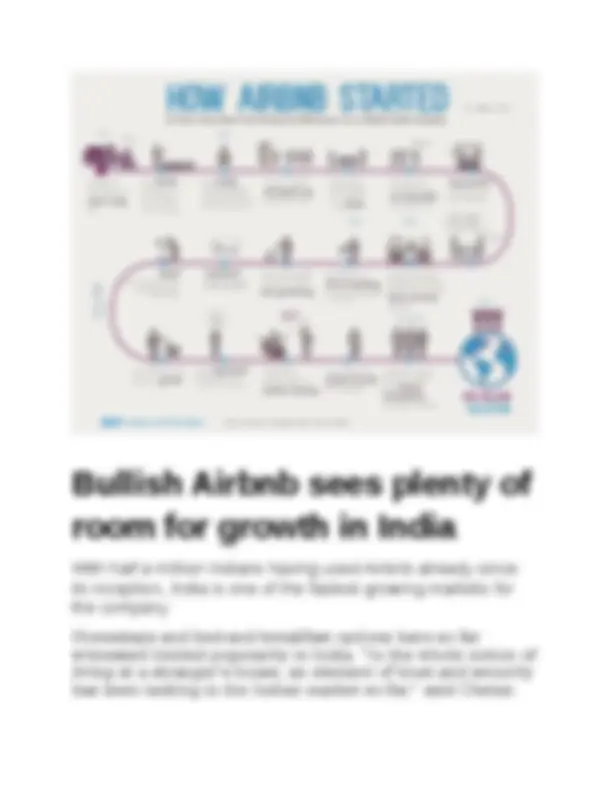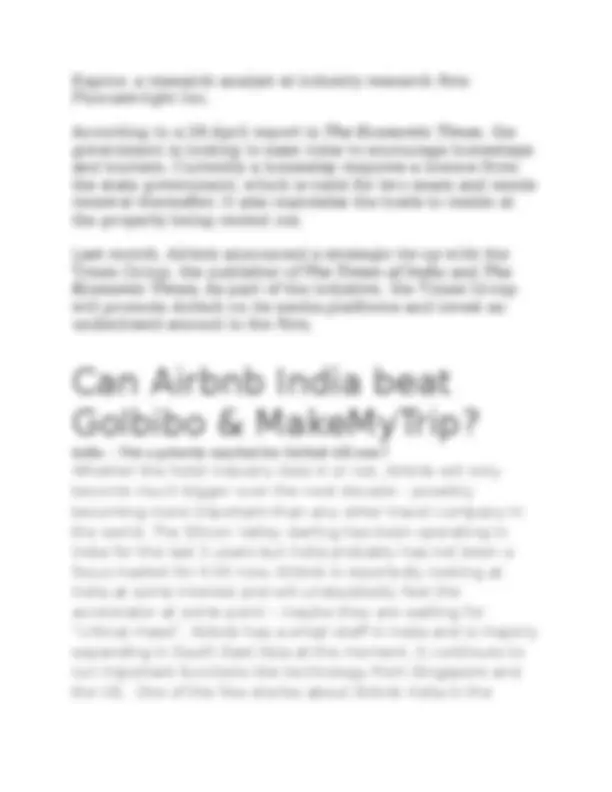









Study with the several resources on Docsity

Earn points by helping other students or get them with a premium plan


Prepare for your exams
Study with the several resources on Docsity

Earn points to download
Earn points by helping other students or get them with a premium plan
Community
Ask the community for help and clear up your study doubts
Discover the best universities in your country according to Docsity users
Free resources
Download our free guides on studying techniques, anxiety management strategies, and thesis advice from Docsity tutors
effective start up company and its details
Typology: Study notes
1 / 13

This page cannot be seen from the preview
Don't miss anything!








Airbnb is an online marketplace and hospitality service, enabling people to lease or rent short-term lodging including vacation rentals, apartment rentals, home stays, hostel beds, or hotel rooms. The company does not own any lodging; it is merely a broker and receives percentage service fees (commissions) from both guests and hosts in conjunction with every booking. It has over 3,000,000 lodging listings in 65,000 cities and 191 countries, and the cost of lodging is set by the host.
How it works Airbnb can be accessed via either the Airbnb websites or mobile applications for iOS, Apple Watch, and Android. Registration and account creation is free. On each booking, the company charges guests a 6%-12% guest services fee and charges hosts a 3%-5% host service fee. Hosts can also offer "experiences", such as excursions, to guests for an additional charge, of which Airbnb takes 20% as a commission. Users can search for lodging using a variety of filters including lodging type, dates, location, and price.]^ Before booking, users must provide a valid name, email address, telephone number, photo, payment information, and, if required by the host, a scan of a government- issued ID. Guests also are required to agree to any house rules of the host.
Safety mechanisms Airbnb had to overcome the obstacle of "stranger danger" to build a level of trust between hosts and guests and instill confidence in its platform. Airbnb did this by requiring user profiles so that members can learn about their hosts and guests ahead of time and by establishing a rating and review system. Founder Joe Gebbia has said that Airbnb is specifically "designed for trust
Airbnb in india Market shaping up in
India?
the Indian economy is growing and accommodation booking site Airbnb is witnessing a lot of momentum here, the company’s co-founder and Chief Technology Officer Nathan Blecharczyk said here on Wednesday. He was here for the official launch of Airbnb in India. The California-based company, launched in 2008, has 2 million listings globally.
In India, 18,000 properties are listed on the Airbnb platform across 100 cities. “We have witnessed 115 per cent growth in listings in India over the last year,” Blecharczyk said, adding that by 2020 the Indian travel market is estimated to be worth $40 billion.
On the safety aspect, Blecharczyk said the company has a proven model and scale, and “half of the hosts on Airbnb are women”. Moreover, each listing is reviewed by several travellers, and this provides assurance to users, he said. It is important for hosts to maintain their standards; else they can be removed from the platform.
Amanpreet Bajaj, Country Manager, Airbnb India, said domestic travellers also present a huge opportunity for the company. “It also allows Indians to be micro- entrepreneurs, by serving as hosts on the platform,” he added.
Transactions on the platform in India has nearly tripled over the past year, the company said in a statement.
Nearly 5 lakh Indian guests have travelled via Airbnb. Also, India is a popular destination for travellers from the US, the UK and Australia, with Goa, New Delhi and Mumbai as top
Is there any different pattern/trend that you see regarding user behavior when it comes to India?
Consumers on the internet are always seeking value! And in that sense users of Airbnb in India are not that different from their counterparts in the west! Indian travellers appreciate the access to amenities like kitchen, wifi, washer/ dryer etc. which is offered at several of our properties globally. We ran a study in India and learnt that the three top motivations to use Airbnb for Indians are value for money, access to amenities and local experience. A combination of all these factors make Airbnb a compelling proposition for our guests.
Kapoor, a research analyst at industry research firm Phocuswright Inc.
According to a 28 April report in The Economic Times , the government is looking to ease rules to encourage homestays and tourism. Currently a homestay requires a licence from the state government, which is valid for two years and needs renewal thereafter. It also mandates the hosts to reside at the property being rented out.
Last month, Airbnb announced a strategic tie-up with the Times Group, the publisher of The Times of India and The Economic Times. As part of the initiative, the Times Group will promote Airbnb on its media platforms and invest an undisclosed amount in the firm.
india – Not a priority market for Airbnb till now? Whether the hotel industry likes it or not, Airbnb will only become much bigger over the next decade – possibly becoming more important than any other travel company in the world. The Silicon Valley darling has been operating in India for the last 3 years but India probably has not been a focus market for it till now. Airbnb is reportedly looking at India at some interest and will undoubtedly foot the accelerator at some point – maybe they are waiting for “critical mass”. Airbnb has a small staff in India and is majorly expanding in South East Asia at the moment. It continues to run important functions like technology from Singapore and the US. One of the few stories about Airbnb India in the
digital media does not have a lot of details about their strategic plans – Airbnb in India Domestic Travel Industry is abuzz with activity Meanwhile, the domestic Indian hospitality sector is abuzz in 2015– room aggregators like Oyo Rooms, Indian booking engines (Makemytrip, Goibibo, etc) and even Airbnb clones like Stayzilla are all vying for a piece of the pie. Add to the mix niche players in the conventional hotel segment like Roomstonite. Sitting on the sidelines is payment giant Paytm, looking to grab a chunk of the huge transaction volume (est USD 70 Billion Annually) which is primarily cash and card right now.
.
Why has Airbnb not focused on India till now? A good case study to answer this question would be Amazon
The hospitality tax regime remains complicated – luxury hotels must be luxury taxes, while homestays are exempt. The lines are blurred as some states charge additional taxes from hospitality companies while some don’t. It would therefore be prudent to incorporate this on their app – for now they are charging service taxes directly from the user and depositing on behalf of the host.
safety is a major concern, there are doubts whether pure online aggregation systems that de humanize the stay process will work. Consider the following facts
Who is the typical Airbnb user in India? Airbnb is still a concept that the Indian user is getting used to. The issues for a lot more Indian users to become paying clients is two fold
A major barrier to the continued proliferation of Airbnb services is establishing consumer trust. Since Airbnb connects individuals to each other versus the traditional model of connecting individuals with an established company, continuing to defy this norm is a challenge that Airbnb constantly faces, and must address while they continue to expand. While Airbnb has insurance policies in place to address issues of vandalism, theft, or violence, the true cost of these incidents lie with the potential damage to Airbnb’s reputation. As Airbnb continues to expand, methods of establishing consumer trust must be adapted over several countries and designed to respect cultural norms.
Legality Issues
Airbnb faces legality issues in both domestic and international markets. There is legal ambiguity with Airbnb’s services and it is not quite clear whether its rental services violate any laws.^12
This may vary from state-to-state and country-to-country, so Airbnb must be cautious of its expansion to minimize the risks of lawsuits and increased pressure from the hotel industry. Renting accommodations for less than 30 days is technically illegal in certain states, so Airbnb must deal with these issues or risk losing its business. Airbnb may need to fix these issues prior to expanding aggressively or implementing new services.
4
Strategic Options
With the arrival of new competition and problematic legal/consumer issues, Airbnb must prioritize a series of strategic options. Although the company currently enjoys a considerable first mover advantage, Airbnb must consider three main options to ensure optimal competitive positioning within the market to secure future financial stability and growth.
Increase usage and establish Airbnb in domestic market
Since the peer-to-peer market is still relatively unknown to the general population, aggressively advertising Airbnb’s business could substantially increase untapped domestic customers waiting to lend or rent new accommodations. The current 200,000 worldwide listings statistic merely shows there are still millions of untapped living spaces. Next, resources can be directed towards developing technology or strategies to differentiate Airbnb from its competitors. When asked about what separates Airbnb from competitors, Brian Chesky merely listed
aggressive expansion and first mover advantage.^13 Airbnb has no sustainable advantage so
developing any edge it can is essential. Airbnb can either focus on addressing its domestic legal issues through lobbying or circumvent the problem by avoiding the states that outlaw P2P accommodation rentals.
Integrate Airbnb’s platforms with other outlets
The peer-to-peer accommodation rental market is similar to the hotel rental industry, so Airbnb can adopt similar partnerships with outside companies to bundle goods. If partnerships are formed, both the outside providers and Airbnb will benefit from increased usage, promoted traffic, and growth in revenues. Partnerships with car rental services, review services, and